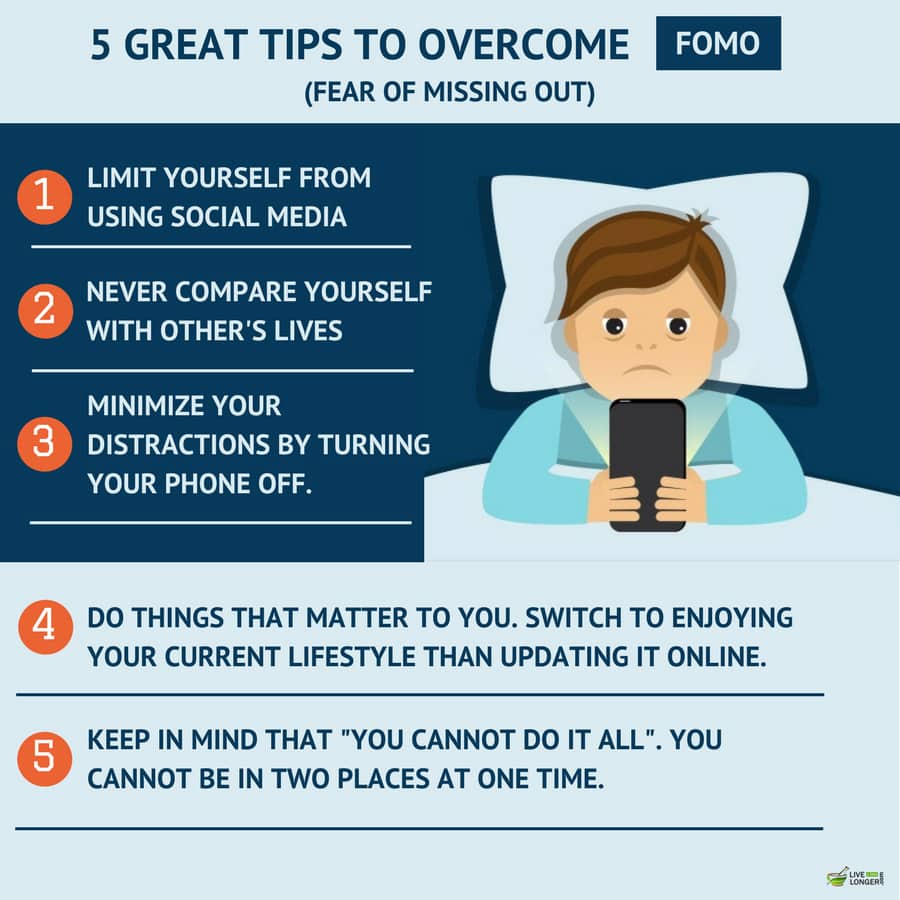FOMO is something that has received a lot of hype in the recent years. Though FOMO started off as a millennial-speak, it turned out so mainstream that the Oxford English included the acronym in their dictionary in 2013.
This study has defined FOMO as:
The uneasy and sometimes all-consuming feeling that you are missing out – that your peers are doing, in the know about, or in possession of more or something better than you’’. Under this framing of FOMO, nearly three-quarters of young adults reported they experienced the phenomenon.
To make it clear for you, Fear Of Missing Out (or FOMO) is a term that is used when an individual feels stressed or experiences anxiety when he or she is not invited to a social event. There is this constant feeling of “being missed out.” FOMO feelings are usually amplified to recurrent visitors of social websites like Facebook, Snapchat, and Instagram, where users look at a stream of videos, comments, and pictures of events, outings, parties, or other activities that they might not be invited to.
With about 24% of the teenagers being “online” constantly, it isn’t a surprise that FOMO is more of a plague among the millennials. In majority of the cases, the motivation of their action/inaction is a trepidation that they are missing the chance of engaging in other activities or experiences that may result in personal satisfaction or gratification. A common sentiment among people who have FOMO is – “I would like to keep my choices open.”
In short, FOMO is a serious concern. There is a strong and positive association between the digital world and depression. According to a survey taken by the ABC news:
- An estimated 66% of the global teenagers have an urge to share their details online while having a good time (the best example is Facebook status).
- About 60% report that they feel worried or anxious when they find that their friends are having an amazing time without them.
- About 51% of them feel restless if they don’t get to know what their buddies are doing.
- About 78% of them claim that it is important for them to be understood by their pals “in jokes.”
Research also demonstrates that FOMO can intensely affect one’s purchasing behavior. This study from CitizenRelations Canada has reported that about 68% of the Canadian Millennials have made an intransigent purchase due to FOMO, which is often within twenty-four hours of seeing someone’s experience. They revealed that their FOMO was activated to outdoor trips (59%), food (29%), and events & parties (56%).
Now, if you happen to be undergoing similar emotions like these, we suggest you to overcome them through 10 simple practices and enhance your relationship’s quality:
1. Limit Yourself From Using Social Media
FOMO may be an old problem, but social websites can make it worse. If you feel that social media is making you feel jealous of other’s lives or perhaps, discontented about yourself, then it is high time for you to limit down the number of hours you spend on Twitter, Facebook, or Instagram.
Social media addiction is a real concern. We end up staring at the screen for hours without enjoying the present life. So, it is vital to fix a time to check your social accounts in a day and try not to exceed that duration. You can even stop alerts from appearing on your tablet or phone.
2. Do Not Compare
Remember that, a runner will never win if he or she is in someone else’s track. Similarly, FOMO is a feeling that will always trick us up from leading the life we wish for. It will make you focus your attention on things that you have never wanted to. It all starts by looking onto different things and then creating an emotion that you are not good enough. Later, you end up comparing your life with others, finally, leading to stress and depression. So, bear in mind that you are beautiful and unique as a person. There is nothing to be compared of.
3. Apply Discernment
Besides distinguishing what are indeed imperative and essential from what are merely enviable, prefer to get rid of things that do not contribute to the quality of life you lead. At times, say “no” to things because this will give you additional time to dedicate to a few experiences, which more rewarding. Bear in mind that “more is not necessarily better.” Concentrate on things that will improve the quality of your experience and not quantity.

4. Be Thankful
Cultivating a thought of gratitude can truly help combat envious and anxious feelings. In fact, many studies have shown that just writing a few things every day that you are thankful about, can increase your life satisfaction. It links gratitude to feelings of joy and better well-being. So, the next time you are feeling jealous of what someone has, practice to redirecting your attention to the optimistic aspects of life. This will surely cheer you up.
5. Modify Your Thinking
Psychologists say that FOMO can essentially be a type of cognitive distortion, which could feature irrational patterns of thoughts—say, for example, imagining that your friends won’t like if you aren’t invited to any social event—such ideas can lead to sadness, depression as well as other mental issues. However, modifying negative thoughts into positive or applying some behavioral therapy methods can be more helpful.
6. Try The “Digital Detox” Camp
If limiting your time on social media is not the right option for you, then a complete hibernation might be helpful. A few people prefer to take some weeks/months off from social platforms and spend quality time with family and friends.
While a few choose to go hiking or camping to unplug themselves, others tend to go on a “digital detox camp.” This is the case when an individual is finding it extremely hard to stop using his or her phone. Though there are many camps that are exclusively held for this, Camp Grounded is one such popular digital detox camp that is located in North California. Adult campers from different regions give up their gadgets for some days and participate in mediation, yoga, swimming, campfires, and other activities.
7. Live An Uninterrupted Life
Social media is. Certainly, one of the best ways stay connected socially. However, while people try to stay “associated,” they tend to withdraw from the activities they are doing. They end up ignoring the individuals they are with, which gradually turns into an interruption. Understand that a human brain is not capable of multitasking. When people try to jump back & forth between the status updates and current moment, they break their lives into a sequence of skips as well as interruptions — which is then again, “missing out.’


